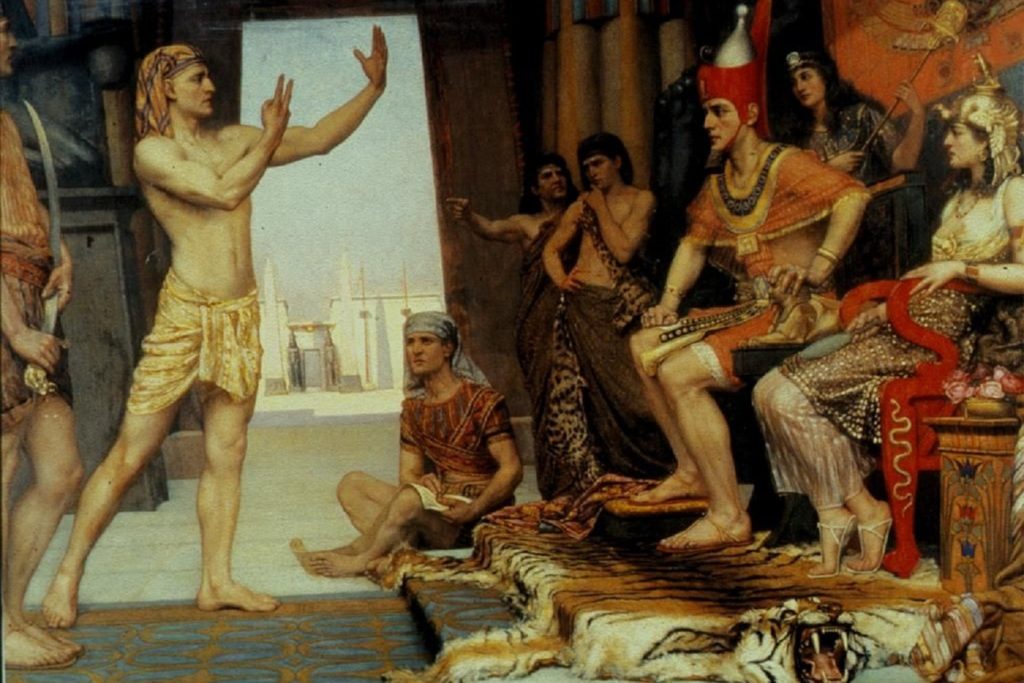Joe Biden is a lifelong Catholic. He was raised in Catholic neighborhoods and was taught in Catholic schools. He may be the most actively religious president since Jimmy Carter—regularly attending Mass and publicly citing Christian principles to justify his policies. Yet his policies reject one of his Church’s most important moral teachings—the right to life of unborn children.
How are we to understand this glaring—possibly damning—inconsistency?
The answer may lie in generally unrecognized lessons from another Joseph—the Old Testament one. The story of Joseph provides insights for all of us who are drawn to politics in an increasingly pagan culture, especially those of us who come from the outskirts of that culture.
Joseph may be the most important biblical role model (both good and bad) for twenty-first century Jews and Christians. His story should compel us to ask ourselves: can we remain faithful to the God of Abraham, Isaac, and Jacob within the American political system?
Start your day with Public Discourse
Sign up and get our daily essays sent straight to your inbox.Two “Ordinary Joes”
Joe Biden has lived the American dream—he shows that any person can grow up to be president. Raised in Scranton, Pennsylvania and later moving with his family to Wilmington, Delaware when he was about ten, the son of a used car salesman, a graduate of what is now the 102nd-ranked law school, a Catholic in a predominantly Protestant and increasingly secular and pagan country, prevailing through personal tragedies and political foibles, he has become the leader of the most powerful nation in the world.
Like Joe Biden, Joseph was a social and political climber. He rose from the backwaters of Canaan, enduring slavery and prison, to lead the most powerful nation in the ancient world. When he was in prison, he solicited Pharaoh’s cupbearer to say a good word for him. When he was called from his prison cell before Pharaoh, he “shaved himself and changed his clothes” (Genesis 41:14, NRSV unless otherwise noted). He was ready with a plan for addressing Egypt’s coming famine, and he suggested that Pharaoh “select a man who is discerning and wise” to administer the plan (41:33–34). That man was right in front of Pharaoh.
Joseph may be the most important biblical role model (both good and bad) for twenty-first century Jews and Christians. His story should compel us to ask ourselves: can we remain faithful to the God of Abraham, Isaac, and Jacob within the American political system?
Without Joseph, Egypt would have suffered the ravages of famine—children with swollen stomachs, women with withered breasts, and men transformed into walking skeletons too weak to shoo flies away. Joseph’s insight, creativity, and administrative abilities enabled him to save the Egyptian people and much of the known world. His story affirms that governmental action can be a means of loving and caring for people—in Joseph’s case, a lot of people.
Likewise, President Biden has demonstrated enormous capabilities. Today, he is faced with enormous challenges and opportunities to do good: how to provide humane and fair treatment to asylum-seekers at our southern border without exacerbating a crisis; how to provide an adequate social safety system without generating dependence and destroying civil society; how to reform police practices without opening the door to more crime; and how to stop violence in the Middle East without begetting more violence.
The Dark Side of Both Stories
Sermons and biblical commentaries focus on the good Joseph did. They give little attention to the dark side of his story that seems to be a significant part of the Genesis author’s intended message. Pharaoh seems to rely completely on Joseph to design and administer the famine aid program. When people “cried to Pharaoh for bread,” he sent them to Joseph: “What he says to you, do.” (41:55) In a series of coercive, monopolistic bargains, Joseph takes the people’s money, livestock, land, and, ultimately, their very selves for Pharaoh in exchange for grain. “As for the people, he made slaves of them from one end of Egypt to the other.” (47:21)
The darkest side of President Biden’s political career has been his embrace of abortion, a practice that, according to the US Conference of Catholic Bishops, “directly and immediately violate[s] the human person’s most fundamental right—the right to life.” Previously, Biden opposed federal funding for abortion, writing a constituent: “the government should not tell those with strong convictions against abortion, such as you and I, that we must pay for them.” Biden rejected this position when he ran for vice president with then-candidate Barack Obama. President Biden has removed the federal ban on order-by-mail abortion pills and the Title X funding ban on abortion referrals, withdrawn the United States from the global life declaration, and moved to restore federal funding for Planned Parenthood. His administration is emerging as the most pro-abortion administration in US history.
The biblical Joseph should have empathized with his victims, for he had been a slave. He had experienced the arbitrary treatment to which slaves are subject—sold by his brothers, resold by the Midianite traders, falsely accused by Potiphar’s wife, and imprisoned at Potiphar’s whim.
Joe Biden knows better as well. The Catholic Church has been the foremost proponent of the sanctity of unborn human life. The U.S. Catholic Bishops denounced the notion that one can claim to be personally opposed to abortion, but support a right to abortion: “Most Americans would recognize the contradiction in the statement, ‘While I am personally opposed to slavery or racism or sexism I cannot force my personal view on the rest of society.’” They have made it clear that the duty to protect life extends to elected officials. “No public official, especially one claiming to be a faithful and serious Catholic, can responsibly advocate for or actively support direct attacks on innocent human life.”
It is a tragedy that the first Catholic president in sixty years actively works to end the lives of the most vulnerable humans. Like the biblical Joseph, President Biden has lost sight of the imago Dei in his victims. Abortion, like slavery, is an assault on those whom God created in His image and an assault on God himself.
Like the biblical Joseph, President Biden has lost sight of the imago Dei in his victims. Abortion, like slavery, is an assault on those whom God created in His image and an assault on God himself.
Longing for Status
The story of the biblical Joseph shows that we should use power for good, not evil, but we make a mistake if we leave it at that. The story also conveys an important message about the seductive nature of status and political power and the motivations of those who seek them. This is an important message for Joe Biden—and for us all.
Joseph’s story suggests that he sought to curry Pharaoh’s favor out of a desire for status rooted in insecurity. Joseph had experienced more than his share of insecurity. He had fallen from son to slave and from household manager to prisoner. As a Hebrew and former shepherd, Joseph of Canaan was a fish out of water in cosmopolitan Egyptian society, which considered eating with Hebrews “an abomination” (43:32) and all shepherds “abhorrent” (46:34). Joseph’s cultural ambivalence is on display when his brothers come to Egypt—Joseph eats alone at one table, his brothers at another, and his Egyptian colleagues at yet another (43:33).
Likewise, Joseph of Scranton was a fish out of water in cosmopolitan Washington, D.C. Biden’s autobiography highlights his Irish Catholic upbringing and the influence of “Grandpop” Finnegan, who passed on his resentment of Scranton’s “silkstocking” “country club” crowd. Biden “started at the bottom” and put into practice the lesson he learned growing up: the “first principle of life, the foundational principle . . . get up!” I suspect Biden gritted his teeth when his elite Yale law graduate friends referred to people from his background as “deplorables” who “cling to their guns and religion.” President Biden is part of what Mary Ann Glendon has called the “chameleon generation” of Catholics, anxious about their status as part of “an immigrant church,” trying to “blend in with established patterns of secular culture,” making “doctrine fit more comfortably with the lifestyles and attitudes of the upwardly mobile,” “crav[ing] acceptance by elite culture,” and ultimately “[selling] its own birthright.”
Both Josephs overcame great odds. They rose from backwater Canaan and Pennsylvania to the power centers of their worlds, from families of shepherds and coal miners to the height of status and society, and from denigrated ethnic and religious backgrounds to Pharaoh’s palace and the White House. But both longed to be in what C. S. Lewis calls “The Inner Ring” and what Hamilton’s Aaron Burr calls “the room where it happened.” Unfortunately, both sacrificed their most important values to get where they got. Joseph enslaved a nation and Joe Biden facilitated the abortion of untold numbers of unborn children.
These challenges are not limited to Catholics or to Democrats. For many Jews and Christians in the United States today, service in either a Trump or a Biden administration would present serious ethical challenges. Each of the major political parties has chosen positions that deviate from important Jewish and Christian moral values. Joseph’s service to Pharaoh provides important lessons to Jews and Christians considering roles in government in an increasingly pagan America.
Government power can provide potential for good, but it can also tempt one to evil. It provides special temptations to a social climber. Whether you are the child of a shepherd from Canaan, of a used car salesman from Scranton, of a real estate developer from Queens, you can do great good in the political realm, but you can also do great harm. It is important to “remember where you came from,” but not to allow where you came from to control what you do. If you are called to public service, you must be aware of your temptations and your vulnerabilities.
For many Jews and Christians in the United States today, service in either a Trump or a Biden administration would present serious ethical challenges. Each of the major political parties has chosen positions that deviate from important Jewish and Christian moral values.
The Last Shall Be First
In this, as in all things, Jesus is the model for Christians. Like our Josephs, he faced insecurities, social pressures, and temptations. Nevertheless, he rejected Satan’s offer of “all the kingdoms of the world and their splendor” (Matthew 4:8). When his disciples argued over their status in the Kingdom of God, he gave them a stunning standard of leadership: “whoever wishes to be great among you must be your slave” (Mt. 20:26).
Where did Jesus come up with the surprising notion of leadership as servanthood? Perhaps he was influenced by yet another Joseph, his earthly father. Scripture tells us that as a child Jesus grew “in wisdom and stature and in favor with God and man” (Luke 2:52, KJV). Just as Jesus’ growth in stature came from the meals his parents fed Him, much of His growth in wisdom probably came from observing and listening to his earthly father—another “ordinary Joe.”
This Joseph is currently being celebrated by the Catholic Church with a special year of St. Joseph. Like our first two Josephs, he was from a humble background—a carpenter from Bethlehem (“one of the little clans of Judah” [Micah 5:2]). Faced with an embarrassing engagement to a pregnant fiancée, he listened to God and welcomed and protected Mary and her unborn child (Matthew 1:24). When confronted with risk to the newborn child from political authorities, Joseph took Mary and the child to Egypt and lived as a refugee (Matthew 2:13–15). We don’t know much about Jesus’ earthly father thereafter. Yet in his very silence, he models humility and courage for those of us who long for social status and recognition.
In an even deeper way, Christ too humbled himself, moving from the highest to the lowest status:
[He] did not regard equality with God
as something to be exploited,
but emptied himself,
taking the form of a slave,
being born in human likeness.
And being found in human form,
he humbled himself
and became obedient to the point of death—
even death on a cross. (Philippians 2: 6b–8)
Christ’s humility, courage, and servanthood provide a model for all who are faced with the challenges and temptations of leadership. The good leader will surrender status to serve “the least of these”: the widow, the orphan, the outsider, and the unborn.













